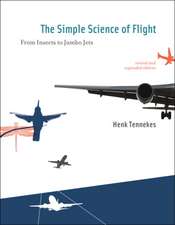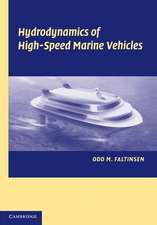Application of Surrogate-based Global Optimization to Aerodynamic Design: Springer Tracts in Mechanical Engineering
Editat de Emiliano Iuliano, Esther Andrés Pérezen Limba Engleză Hardback – 16 oct 2015
The core issue of a design-optimization problem is the search process involved. However, when facing complex problems, the high-dimensionality of the design space and the high-multi-modality of the target functions cannot be tackled with standard techniques.
In recent years, global optimization using meta-models has been widely applied to design exploration in order to rapidly investigate the design space and find sub-optimal solutions. Indeed, surrogate and reduced-order models can provide a valuable alternative at a much lower computational cost. In this context, this volume offers advanced surrogate modeling applications and optimization techniques featuring reasonable computational resources. It also discusses basic theory concepts and their application to aerodynamic design cases. It is aimed at researchers and engineers who deal with complex aerodynamic design problems on a daily basis and employ expensive simulations to solve them.
| Toate formatele și edițiile | Preț | Express |
|---|---|---|
| Paperback (1) | 630.25 lei 43-57 zile | |
| Springer International Publishing – 23 aug 2016 | 630.25 lei 43-57 zile | |
| Hardback (1) | 636.30 lei 43-57 zile | |
| Springer International Publishing – 16 oct 2015 | 636.30 lei 43-57 zile |
Din seria Springer Tracts in Mechanical Engineering
- 18%
 Preț: 1117.03 lei
Preț: 1117.03 lei - 18%
 Preț: 948.16 lei
Preț: 948.16 lei - 18%
 Preț: 787.91 lei
Preț: 787.91 lei - 18%
 Preț: 1004.99 lei
Preț: 1004.99 lei -
 Preț: 419.06 lei
Preț: 419.06 lei - 17%
 Preț: 539.21 lei
Preț: 539.21 lei - 18%
 Preț: 944.19 lei
Preț: 944.19 lei - 15%
 Preț: 669.01 lei
Preț: 669.01 lei - 15%
 Preț: 638.43 lei
Preț: 638.43 lei - 15%
 Preț: 638.89 lei
Preț: 638.89 lei - 15%
 Preț: 639.90 lei
Preț: 639.90 lei - 18%
 Preț: 950.03 lei
Preț: 950.03 lei - 18%
 Preț: 1012.84 lei
Preț: 1012.84 lei -
 Preț: 388.72 lei
Preț: 388.72 lei - 18%
 Preț: 1005.74 lei
Preț: 1005.74 lei - 15%
 Preț: 641.85 lei
Preț: 641.85 lei - 18%
 Preț: 896.08 lei
Preț: 896.08 lei - 18%
 Preț: 962.03 lei
Preț: 962.03 lei - 15%
 Preț: 637.46 lei
Preț: 637.46 lei - 15%
 Preț: 637.28 lei
Preț: 637.28 lei - 15%
 Preț: 639.73 lei
Preț: 639.73 lei - 15%
 Preț: 640.71 lei
Preț: 640.71 lei -
 Preț: 398.92 lei
Preț: 398.92 lei - 15%
 Preț: 644.49 lei
Preț: 644.49 lei - 15%
 Preț: 636.12 lei
Preț: 636.12 lei - 15%
 Preț: 699.77 lei
Preț: 699.77 lei - 15%
 Preț: 651.67 lei
Preț: 651.67 lei - 24%
 Preț: 910.50 lei
Preț: 910.50 lei - 15%
 Preț: 647.40 lei
Preț: 647.40 lei - 24%
 Preț: 808.06 lei
Preț: 808.06 lei - 18%
 Preț: 785.86 lei
Preț: 785.86 lei - 15%
 Preț: 647.40 lei
Preț: 647.40 lei - 15%
 Preț: 693.57 lei
Preț: 693.57 lei - 20%
 Preț: 572.40 lei
Preț: 572.40 lei - 15%
 Preț: 695.85 lei
Preț: 695.85 lei -
 Preț: 454.74 lei
Preț: 454.74 lei - 15%
 Preț: 651.19 lei
Preț: 651.19 lei - 18%
 Preț: 730.65 lei
Preț: 730.65 lei
Preț: 636.30 lei
Preț vechi: 748.59 lei
-15% Nou
Puncte Express: 954
Preț estimativ în valută:
121.79€ • 132.34$ • 102.37£
121.79€ • 132.34$ • 102.37£
Carte tipărită la comandă
Livrare economică 21 aprilie-05 mai
Preluare comenzi: 021 569.72.76
Specificații
ISBN-13: 9783319215051
ISBN-10: 3319215051
Pagini: 80
Ilustrații: XIV, 72 p.
Dimensiuni: 155 x 235 x 15 mm
Greutate: 0.3 kg
Ediția:1st ed. 2016
Editura: Springer International Publishing
Colecția Springer
Seria Springer Tracts in Mechanical Engineering
Locul publicării:Cham, Switzerland
ISBN-10: 3319215051
Pagini: 80
Ilustrații: XIV, 72 p.
Dimensiuni: 155 x 235 x 15 mm
Greutate: 0.3 kg
Ediția:1st ed. 2016
Editura: Springer International Publishing
Colecția Springer
Seria Springer Tracts in Mechanical Engineering
Locul publicării:Cham, Switzerland
Public țintă
ResearchTextul de pe ultima copertă
Aerodynamic design, like many other engineering applications, is increasingly relying on computational power. The growing need for multi-disciplinarity and high fidelity in design optimization for industrial applications requires a huge number of repeated simulations in order to find an optimal design candidate. The main drawback is that each simulation can be computationally expensive – this becomes an even bigger issue when used within parametric studies, automated search or optimization loops, which typically may require thousands of analysis evaluations.
The core issue of a design-optimization problem is the search process involved. However, when facing complex problems, the high-dimensionality of the design space and the high-multi-modality of the target functions cannot be tackled with standard techniques.
In recent years, global optimization using meta-models has been widely applied to design exploration in order to rapidly investigate the design space and find sub-optimal solutions. Indeed, surrogate and reduced-order models can provide a valuable alternative at a much lower computational cost. In this context, this volume offers advanced surrogate modeling applications and optimization techniques featuring reasonable computational resources. It also discusses basic theory concepts and their application to aerodynamic design cases. It is aimed at researchers and engineers who deal with complex aerodynamic design problems on a daily basis and employ expensive simulations to solve them.
The core issue of a design-optimization problem is the search process involved. However, when facing complex problems, the high-dimensionality of the design space and the high-multi-modality of the target functions cannot be tackled with standard techniques.
In recent years, global optimization using meta-models has been widely applied to design exploration in order to rapidly investigate the design space and find sub-optimal solutions. Indeed, surrogate and reduced-order models can provide a valuable alternative at a much lower computational cost. In this context, this volume offers advanced surrogate modeling applications and optimization techniques featuring reasonable computational resources. It also discusses basic theory concepts and their application to aerodynamic design cases. It is aimed at researchers and engineers who deal with complex aerodynamic design problems on a daily basis and employ expensive simulations to solve them.
Caracteristici
Innovative methods are presented opening new frontiers towards a more efficient aerodynamic design The usage of surrogate models in the preliminary or detailed aerodynamic design phase is envisaged to provide significant benefits in terms of computational cost and time savings The proposed methods and applications are in line with industrial interest














